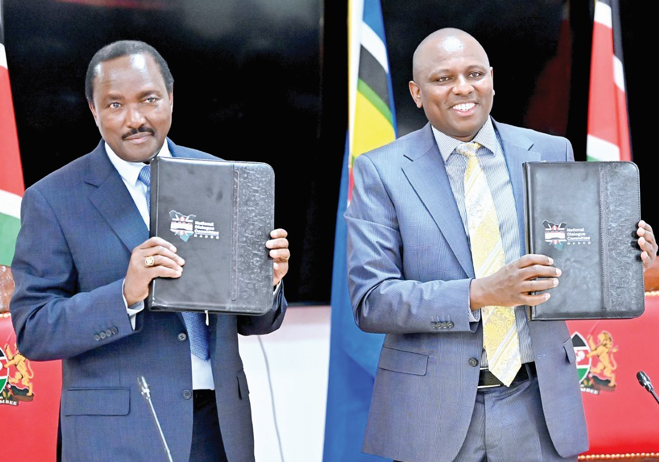Bipartisan talks to kick off as teams settle on agenda
By Rawlings, August 31, 2023The bipartisan talks between the government and the opposition will finally kick off tomorrow (Friday) after the technical teams agreed on the issues to be discussed.
The National Dialogue Committee (NADCO) co-chaired by National Assembly Leader of Majority Kimani Ichung’wa and Azimio la Umoja’s Kalonzo Musyoka announced yesterday that it had finally adopted a framework that will guide the talks, signaling a non-contested approach to the issues.
The adoption of the framework comes after the Senate passed a motion establishing the 10-member committee members and another eight-member technical team to support the functions of the team on Tuesday.
“Today marks a significant stride towards ushering in a new era of peaceful and constructive political negotiations. Determined to rewrite our history, we have formalised the framework agreement and agenda that will be the basis of the National Dialogue Committee’s talks,” said NADCO Co-chair Kimani Ichung’wa on his twitter account.
The technical committee identified the five broad agenda items as including outstanding constitutional matters such as Article 43 of the Constitution, the cost of living and related issues, implementation of the “two-thirds gender rule”, governance issues, including promoting national unity and inclusivity in public appointments and adequate checks and balances.
The eight member technical team has further listed electoral justice and related matters which will have restructuring and reconstitution of the Independent Electoral and Boundaries Commission (IEBC), boundaries delimitation and audit of the 2022 presidential election.
Mandate
The committee will also discuss and agree on entrenching National Government Constituencies Development Fund (NG-CDF), National Government Affirmative Action Fund (NGAAF) and the Senate Oversight Fund in the constitution.
In addition, the panel will also discuss on the establishment and Entrenchment of the office of the Leader of the Official Opposition and the office of the Prime Cabinet Secretary.
Opposition coalition Azimio had proposed that the issue of fidelity to Political Parties/Coalitions and the law on multiparty democracy should also form part of the negotiations, a proposal that has been granted and will be tabled for discussion including preventing interference with political parties/coalitions.
“This momentous step underscores our commitment to prioritizing the greater good of our nation above all else. By embarking on this journey, we are collectively rejecting the use of violence as a currency in political discourse,” said Ichung’wa.
Ichung’wa further charged that they had laid the foundation for discussions that hopefully will lead to innovative solutions that will enrich the nation.
“Our dedication to open dialogue, collaboration and understanding signifies our genuine intent to shape a brighter future for our country. The agenda has been set, ratified and adopted.”
The mandate of the Committee shall be to facilitate dialogue and consensus building and recommend appropriate constitutional, legal and policy reforms on issues of concern to the people of Kenya.
The issues will be framed by the Dialogue Committee, in line with the Constitution and the laws of the Kenya and respecting the functional and institutional integrity of state organs.
“The Committee shall facilitate public participation in the National Dialogue and Negotiations. The Committee may invite, engage with and consider submissions from stakeholders, collate views from the public and engage experts, professionals and other technical resource persons as necessary,” reads part of the statement of issues for negotiations.
The framework which has now been adopted, provides that each team shall formulate specific Issues for discussion and resolution by the Committee. “The Statement of Issues, once adopted and signed by the Members of the Committee, shall be deemed to be part of this Agreement,” reads part of the Framework Agreement.
The framework agreement further states that the teams shall engage in good faith on the issues identified by each party and work towards finding common ground and developing mutually acceptable solutions.
The signed document also posits that the issues for discussion and resolution proposed by either team shall be harmonised and adopted by consensus or by a majority of all committee members and that the committee may consider and adopt such other Issues as may be communicated to it by the public and any person for discussion.
The document stipulates that a party may replace a member of the committee and such replacement shall be in writing under the hand of the Delegation Leader or the Leader of the Party making the replacement.
“The Committee may form sub-committees or panels and delegate to them the crafting of proposals on the resolution of specific issues or the exercise of the committee’s mandate. All sub-committees and panels of the Committee shall report to the Committee.”
Adjournment
The team shall have a Secretariat comprising persons seconded from the staff of Parliament and may include researchers, drafters, secretaries, stenographers, copy typists and such other cadres of professionals as the Committee may from time to time require.
“The Secretariat shall be responsible for the hospitality, logistical, hansard and other administrative requirements of the Committee.”
And to protect the negotiations from mutilations, the technical team in the harmonized framework has stated that where the Committee reaches a consensus on an issue in consultation with the coalition structures, the relevant part of the Final Report and Proposals shall be ring-fenced from amendment.
The harmonised framework document also states that the Committee may adjourn its proceedings for a period not exceeding three (3) days to build consensus on any Issue.
If there are irreconcilable differences on any such Issue at the end of the adjournment period, the matter shall be referred to the Coalition Leaders for directions and resolution.
